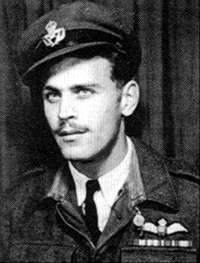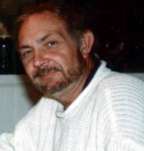I shook his hand. A
pleasure to share
a meal and a story 60 years later.
The Sergeant Who
Captured A Division
by Wallace Wood
|

Clive Ridpath |
Eve of July 4, 2004
As a way to mark the Fourth of July celebration
I visited my old Homestead Mobile Park friends in Santa Cruz, California,
for a dinner and get-together. Of course we had a wonderful time.
I happened to sit next to someone I never met before, a heavy-set
man of average height who had trouble walking. Halfway through his
conversation with a woman across from him, my ears picked up something
like ..."Yes, the Yanks had serious trouble at Omaha Beach,
but so did the Brits at Sword , Juno and Gold..."
That got my attention.
"Were you there?" I asked.
"Oh, yes. Not on the beach. I was flying a C-47 dropping supplies
and towing gliders and such."
|
"Ah, the old Gooney Bird."
He gave a short laugh. "Yes, what an aircraft. Designed
in 1933 or so as a passenger plane. Could take fantastic amounts
of damage and keep flying; parts blown off, bits of the wing,
bits of the tail, but she would bring you home."
While he expounded his theory of why the
Gooney Bird could survive
|

Gooney Bird with D-Day markings. Courtesy
www. bragg.army.mil
Click image for a larger view |
such damage, I studied him. Dark hair with
little gray, very sharp almost protruding eyes. Didn't look old enough
to be in the war. His Brit accent had an odd burr.
..."You see, the German gunners were very good. You had to aim
ahead of the aircraft, lead it like a hunter shooting a rabbit, and
of course you were aiming for the center of bulk. But the
|
|
C-47 Dakota
had nothing in the center but cargo. The crew was all crammed
up front. So the bullets passed right through without much damage.."
With all the recent WWII focus, he was glad to find an audience
and get a little attention for what he had done as a defining
moment of his life.
..."I was only 20 and so was our crew. When the paratroopers
|
climbed on board, I could almost hear them
thinking: 'our lives are in the hands of these kids?' "
"D-Day was bad," I observed. "A lot of mistakes."
..."Oh, the worst mistake was the night drops. Not possible to
see where your parachute was coming down. They landed in trees, on
rooftops, on steeples..."
"But wasn't that better than daylight when the enemy could shoot
you like sitting ducks?" Another neighbor had joined in. Our
flier had an audience of five now, including the lady conversationalist
across from him.
..."I don't think so," he answered. "You could see
where you were going and so could the pilots. So many paratroopers
simply got lost, especially at night, but even in daylight."
|
Then there was the disaster at Arnhem,
a Dutch town, where paratroops were trying to capture bridges
into German territory and spearhead a killer strike into the
Reich homeland. "You know, 'A Bridge Too Far..."
he meant the movie. (See
Market Garden)
"I was towing gliders in, and
looked down on the Ardennes Forest. I could see hundreds of
German tanks and thousands of troops hidden in there. They
knew we were coming. They
|
|
didn't know when, but they had a good idea
where. You've heard it said, 'your blood runs cold'? Well, my blood
ran cold when I saw that."

C-47 with D-Day markins. Courtesy
www.aero-pix.com
Click image for a larger view |
"You let the gliders loose anyway?" someone asked.
"Had to. Couldn't go back. And had to bring in another
set as reinforcements next day. Told the staff, of course,
at de-brief. Just shook their heads. Was already planned."
He added he had heard "a lot of rat-a-tat
drumming" during the flight." When he checked his
plane, "it had a neat row of dents underneath from machine
guns. I thanked God they didn't
|
p enetrate." Later, at the Battle of
the Bulge and "the last push of the Luftwaffe, I looked up to
see a Focke-Wulf 190 heading right toward us. I put the stick forward
and dove. We had no armament, not a thing. Your only hope was to get
down to treetop level and make a steep turn (the C-47 was very slow).
The fighter pilot had to slow down to get at you, and you hoped he
would lose control at such a slow speed and crash."
Fortunately, as his eyes bugged out at the sight of the charging FW
190, another sight came into view. "A P-51 Mustang saw what was
going on and came after the '190. Well, the German pilot knew wars
are not won by dead heroes. He got the hell out of there. I don't
know who that P-51 pilot was, but I'm eternally grateful."
|
In his opinion, "two things
won the war. The C-47 with all the supplies and troops it
carried, and the Jeep."
His last story was a good one. Transferred
to India after VE-Day, his squadron was ferrying men and supplies
to the front (he didn't fly The
Hump, but just about everyplace else).
"We heard the news that Japan
had surrendered. Two days later, we found out why (meaning
the atomic bombs). (See
|
 FW-190 courtesy
macswitch.tripod.com/ berlingermany/
FW-190 courtesy
macswitch.tripod.com/ berlingermany/
Click image
for a larger view |
Trinity,
THE DESTROYER OF WORLDS) We still had hard work to do bringing
in food and supplies to the prison camps held by the Japanese. Most
of those prisoners were starving. We had taken off from Rangoon (Burma)
headed for Saigon (Vietnam). You've heard of a wall of water? Well,
we saw a solid wall of water in front of us, full of rain and lightning,
up to 35,000 feet or more. The C-47 wouldn't fly much over 15,000.
No way we were going to fly into that. We tried to go around, but
couldn't. It was coming too fast. We couldn't make any base now.
"Nothing to do but look for a "found" airstrip, anything
to land on. The jungle was just like a green carpet. Then we saw a
red-rock airstrip below. Stood out like a sign in the green jungle.
Not an aircraft anywhere. Empty. Nothing. After a couple of look-sees,
I took it in.
"No sooner had I cut the fans and
rolled to a stop than a truck full of Japanese soldiers drove out
of the jungle headed right for us.
"We looked at each other in the cockpit. All we had were our
sidearms. Nothing to fight a lorry full of soldiers. "When
we exited, the soldiers were all around us. The Japanese officer
marched up to us and saluted. I almost fainted with relief."

Gooney Bird with D-Day markings. Courtesy
www. bragg.army.mil
Click image for a larger view |
The fliers were
driven to the Japanese camp. "It was a whole division!
We were ushered into the office, and there was a Japanese adjutant
who spoke better English than I did. He explained to me as the
pilot that they had heard of the surrender. He said the division
general wanted to offer his troops' surrender to someone, and
would I mind if he surrendered to me?
"So we had a little ceremony where
I accepted his sword and pistol." |
T he adjutant had lived in England., he said,
and made sure the prisoners of the Japanese were well-treated, an
exceptional thing among Japanese occupiers. "They treated us
very well indeed. An ex-P.O.W. told me that the Nip troops got, the
prisoners got, all due to that adjutant."
The aircrew gassed up and flew on once the storm had passed. After
landing, he explained to his staff officer about the surrender.
"Wot! You're just a bloody staff sergeant, not an officer. How
dare you accept a surrender?" the officer demanded.
"Well, sir, I told him, I sure as hell wasn't going to argue
about it."
I asked this lucky C-47 pilot his name.
"Clive," he told me. "Clive Ridpath, sounds like Red
Path. I'm English, of Scottish descent."
Later, when I told him I was writing down his story, he made some
corrections and additions. "I joined the R.A.F. at seventeen-and-a-quarter,
right out of the student Air Training Corps. Don't know why they insisted
on that 'quarter'. I'm 80 years old now. I served with 512 Squadron,
R.A.F. 46 Group flying out of Broadwell, Oxfordshire. I'm not sure
it was the Ardennes Forest we flew over, since Arnhem is in Holland.
We flew over a lot of forest, that's all I know.
"But the most important thing is to mention the work we did flying
out the wounded. If the troops got hit, they could be at a hospital
in England in a few hours. As fast as the engineers could lay down
the "Summerfeld" tracking over the grass ---that was interlocking
metal mesh invented by the Americans --- we flew in with a nurse to
pick them up after D-Day. It was often so close to the front you could
almost hear the fighting. It meant a lot to those lads to know they
would be home soon."
I shook his hand. A pleasure to share a meal and a story 60 years
later.
Wallace Wood (no relation to the famed Mad Magazine
cartoonist) is a San Jose State University journalism graduate.
He worked for the San Jose Mercury/News as a stringer, then
briefly for the Sunnyvale Standard/Mt.View Register-Leader (now
defunct) before spending years at the Santa Cruz Sentinel. All
California papers. He is now "retired".
A series of his on paper subdivisions won third place in Associated
Press competition for the tiny Sentinel statewide behind two
L.A. Times writers. But another series on the business of death
at funeral homes had greater impact, leading to many self-imposed
reforms in the industry. |

Wallace Wood
Click image for a larger view |

Send Corrections, additions, and input to:
WebMaster/Editor


|







